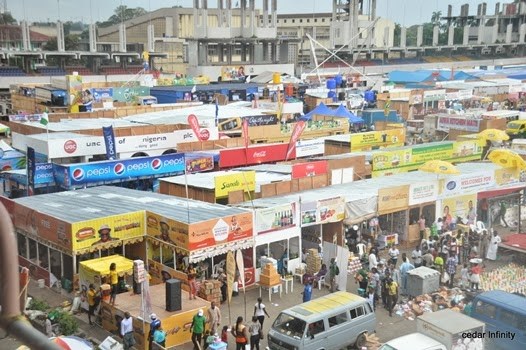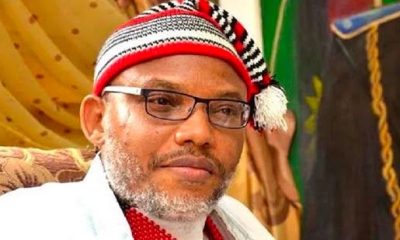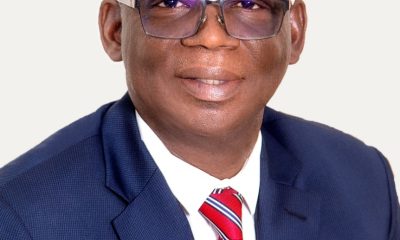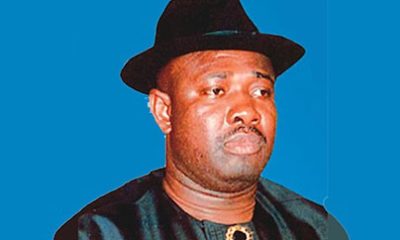Economy
Global Growth Remains Unchanged at 3.2%, as Inflation Recedes- IMF

The International Monetary Fund (IMF),, says global growth is projected to remain unchanged at 3.2 per cent in 2024 and 2025, as Inflation recedes.
This is according to the IMF’s latest World Economic Outlook (WEO) Update Report for October 2024: “Policy Pivot, Rising Threats,” released on Tuesday during the IMF/ World Bank Meetings in Washington D.
C.The report said though the projection was in line with the July and April 2024 WEO, there had been notable revisions beneath the surface since the April WEO.
According to the report, some low-income and developing economies have seen sizable downside growth revisions, often tied to disruptions to production and shipping of commodities, especially oil, conflicts, civil unrest, and extreme weather events.
“These have been compensated for by upgrades to the forecast for emerging Asia, where surging demand for semiconductors and electronics, driven by significant investments in artificial intelligence has bolstered growth.”
It said in advanced economies, growth in the United States was strong, at 2.8 per cent in 2024 but will revert toward its potential in 2025.
The report said for advanced European economies, a modest growth rebound was expected in 2025, with output approaching potential.
For emerging markets and developing economies, it said the growth outlook was very stable around 4.2 per cent in 2024 and 2025, with continued robust performance from emerging Asia.
“Five years from now, global growth should reach 3.1 per cent, a mediocre performance compared with the prepandemic average.”
The report showed that there was global disinflation even though service price inflation persists in some countries.
“After peaking at 9.4 per cent year-on-year in the third quarter of 2022, we now project headline inflation will fall to 3.5 per cent by the end of next year.
“ This is slightly below the average during the two decades before the pandemic.
“In most countries, inflation is now hovering close to central bank targets, paving the way for monetary easing across major central banks.”
The report said the return of inflation near central bank targets paved H the way for a policy triple pivot which would provide the much-needed macroeconomic breathing room, at a time when risks and challenges remain elevated.
“The first pivot on monetary policy is underway already. Since June, major central banks in advanced economies have started to cut policy rates, moving toward a neutral stance.
“This will support activity at a time when many advanced economies’ labor markets are showing signs of cooling, with rising unemployment rates.
‘Lower interest rates in major economies will ease the pressure on emerging market economies, with their currencies strengthening against the U. U. S dollar and financial conditions improving.
“This will help reduce imported inflation, allowing these countries to pursue their own disinflation path more easily.”
The report said the second pivot was on fiscal policy and would require countries to stabilise debt dynamics and rebuild much-needed fiscal buffers.
“The more credible and disciplined the fiscal adjustment, the more monetary policy can play a supporting role by easing policy rates while keeping inflation in check.
“The pace of adjustment should be tailored to country-specific circumstances.”
It said the third pivot and the hardest was towards growth-enhancing reforms.
The report said structural reforms were necessary to lift medium-term growth prospects, but support for the most vulnerable should be maintained
It said for reforms to be successful and socially accepted, there was a need to build trust between government and citizens.
“ Building trust between government and citizens, a two-way process throughout the policy design and the inclusion of proper compensation to offset potential harms, are essential features.
The report said that multilateral cooperation was needed more than ever to accelerate the green transition and to support debt-restructuring efforts. (NAN)
Economy
Customs Zone D Seizes Contraband Worth N110m

The Nigeria Customs Service (NCS), Federal Operation Unit (FOU), Zone D, has seized smuggled goods worth over N110 million between April 20 till date.
The Comptroller of Customs, Abubakar Umar, said this at a news conference on Tuesday in Bauchi.
He listed the seized items to include 11,200 litres of petrol; 192 bales of second hand clothing, 140 cartons of pasta, 125 pairs of jungle boots, 47 bags of foreign parboiled rice and 9.
40 kilogramme of pangolin scales.Umar said the items were seized through increased patrols, intelligence-led operations, and strengthened inter-agency collaboration.
The comptroller said the pangolin scales would be handed over to the National Environmental Standards and Regulations Enforcement Agency (NESREA) for appropriate action, while the seized petrol would be auctioned, and the proceeds remitted to the federation account.
He attributed the decrease in smuggling activities of wildlife, narcotics, and fuel to the dedication and professionalism displayed by the personnel in line with Sections 226 and 245 of the NCS Act 2023.
The comptroller enjoined traders to remain law abiding, adding the service would scale up sensitisation activities to combat smuggling.
“We remain resolute in securing the borders and contributing to Nigeria’s economic development,” he said.
The FOU Zone D comprises Adamawa; Taraba, Bauchi, Gombe, Borno, Yobe, Plateau, Benue and Nasarawa. (NAN)
Economy
Trade Tensions: Global Economy Stands at Fragile Turning Point -UN

The UN Department of Economic and Social Affairs (UN DESA) has said that the global economy stands at a fragile turning point amid escalating trade tensions and growing policy uncertainties.UN DESA, in a report published on Thursday, stated that tariff-driven price pressures were adding to inflation risks, leaving trade-dependent economies particularly vulnerable.
It stated that higher tariffs and shifting trade policies were threatening to disrupt global supply chains, raise production costs, and delay key investment decisions – all of this weakening the prospects for global growth. The economic slowdown is widespread, affecting both developed and developing economies around the world, according to the report.For instance, in the United States, growth is projected to slow “significantly”, as higher tariffs and policy uncertainty are expected to weigh on private investment and consumer spending.Several major developing economies, including Brazil and Mexico, are also experiencing downward revisions in their growth forecasts.China’s economy is expected to grow by 4.6 per cent this year, down from 5.0 per cent in 2024. This slowdown reflects a weakening in consumer confidence, disruptions in export-driven manufacturing, and ongoing challenges in the Chinese property sector.By early 2025, inflation had exceeded pre-pandemic averages in two-thirds of countries worldwide, with more than 20 developing economies experiencing double-digit inflation rates.This comes despite global headline inflation easing between 2023 and 2024.Food inflation remained especially high in Africa, and in South and Western Asia, averaging above six per cent. This continues to hit low-income households hardest.Rising trade barriers and climate-related shocks are further driving up inflation, highlighting the urgent need for coordinated policies to stabilise prices and protect the most vulnerable populations.“The tariff shock risks hitting vulnerable developing countries hard,” Li Junhua, UN Under-Secretary-General for Economic and Social Affairs, said in a statement.As central banks try to balance the need to control inflation with efforts to support weakening economies, many governments – particularly in developing countries – have limited fiscal space. This makes it more difficult for them to respond effectively to the economic slowdown.For many developing countries, this challenging economic outlook threatens efforts to create jobs, reduce poverty, and tackle inequality, the report underlines. (NAN)Economy
FG To Finalize N1.5trn Road Concession Project- Edun

The Minister of Finance and Coordinating Minister of the Economy, Mr Wale Edun, says the Federal Government will soon finalise N1.5 trillion road concession project.
Edun made the statement during a meeting with some private sector investors in Abuja on Wednesday.
He said that the government was on the verge of finalising the landmark N1.
5 trillion road concession project, launched in 2021 under the Highway Development and Management Initiative (HDMI).The minister said that the initiative aimed to involve private sector partners in the reconstruction and management of nine major highways across the country, spanning approximately 900 kilometers.
He said that the partners had almost completed all arrangements for the highways, which they would finance, rebuild, and maintain under 25-years concession agreements.
Edun said that the concessionaires were expected to recoup their investments through tolling fees.
“We met the concessionaires who have virtually concluded all the agreement arrangements for nine roads, nine major highways, which they are contracting to refinance the rebuilding of and to recover their funds from tolling fees under 25-year or so agreements.
“And we met them to iron out the remaining administrative obstacles for the kicking off construction of these roads,” he said.
Edun said that the substantial private sector investment would bridge budgetary gaps.
He added that it would also allow investors to undertake revenue-generating projects, leveraging their expertise and resources for long-term implementation and maintenance.
“Thereafter, it will be a question of signing the addendums and moving to the site.
“As you know, already the 125-kilometer Benin–Asaba Highway concession agreement has been signed. The addendum has been signed.
“All arrangements have been finalised, in fact, the ministry of works have handed over the road to the concessionaires.
“They have already started the preliminary arrangements for reconstruction of that road in place of a 10 lane highway.
“It is an investment, it’s a project and an initiative that will reduce the travel time between Benin and Asaba right up to the Niger Bridge,” the minister said.
Edun said that the Benin–Asaba Highway project, which has already commenced, is expected to reduce travel time between Benin and Asaba from four hours to one hour, significantly enhancing productivity and efficiency in the region.
He described the HDMI, launched in 2021, as a strategic programme by the federal government aimed at attracting private sector investment to improve Nigeria’s federal road network.
Edun said that the initiative seeks to address the challenges of inadequate funding and maintenance by leveraging Public-Private Partnerships (PPP) to develop and manage road infrastructure.
Under the HDMI, 12 highways were initially selected for concession, covering a total of 1,963 kilometers.
These roads include Benin–Asaba, Abuja–Lokoja, Kano–Katsina, Onitsha–Owerri–Aba, Shagamu–Benin, Abuja–Keffi–Akwanga, Kano–Shuari.
Others are Potiskum–Damaturu, Lokoja–Benin, Enugu–Port Harcourt, Ilorin–Jebba, Lagos–Ota–Abeokuta, and Lagos–Badagry–Seme roads.
The minister said that the initiative was projected to generate over 50,000 direct and 200,000 indirect jobs, contributing significantly to the country’s economic growth and development.
The Minister of Works, Engineer David Umahi who joined the meeting virtually reassured the private sector partners on the HDMI of the federal government commitment.
He said that everything possible would be done to resolve the contending issues, adding he will soon be back to address all pending issues.
One of the concessionaires, Mr Kola Karim, representing Shoreline, emphasised the need for right and enforceable documents stipulating the takeoff and handover dates, which would attract investors to invest their funds.
Other private sector partners also requested for the addendum to the original agreement to be signed that would enable toll sections of the completed highways while work was in progress on other sections.
They noted that each concessionaire has unique challenges that should be dealt with accordingly.
Also in the meeting were Minister of Budget and Economic Planning, Abubakar Bagudu, and the Director General Infrastructure Concession and Regulatory Commission (ICRC), Dr Jobson Ewalefoh





















